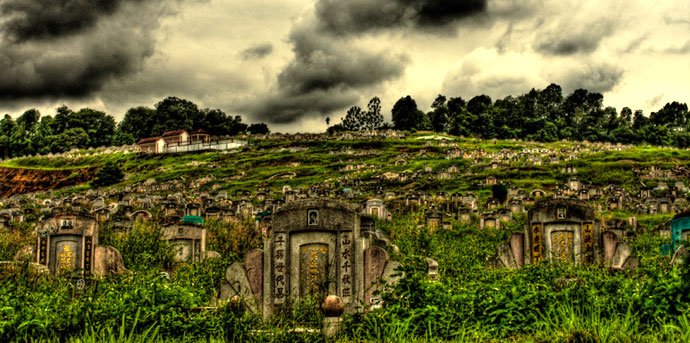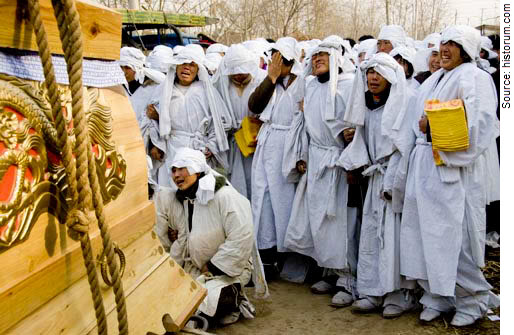Ashes for Ashes
A Chinese funeral – by Kim Willcocks

It was a shock to us all when Lao Lao, my Chinese grandmother-in-law, died. She was 88, which was, as we say in England, a good innings. But she had been so hale and hearty until the end that most of her family felt sure she would reach a hundred. My wife was very close to her as Lao Lao had basically brought her up while my wife’s busy parents worked.
Lao Lao’s life offers a glimpse at how much China has changed. She had bound feet and was sold off as a child because her family couldn’t afford to keep her. I didn’t know her much and couldn’t really talk to her but she smiled at me a lot and was happy to welcome me into her family. Even though she was very conservative in lots of ways, she didn’t think that the fact that her little granddaughter had married a bignose was any problem at all.
In any case, this was my first Chinese funeral, and this is how it went.
The day started very early as the family gathered at her death bed at 5 in the morning and performed a ceremony that involved breaking a pot to release Lao Lao’s soul from the room. I stood outside. We then drove to the mortuary to make sure we arrived in good time for our 6.15am allotted slot. The roads are fairly empty at the crack of dawn so it was in good time that we drove up the beautiful mountain road to the big red brick buildings.
There were a fair few cars already there, and as we entered the crematorium I was immediately confronted by two of China’s inescapable characteristics. The place was heaving with people and the air was thick with cigarette smoke. A lot of folk in China when confronted with death rites of a morning like to indulge in a few comforting cigarettes, it seems.
We blinked our way up the stairs and waited our turn outside the room where the body is presented to the family for the last time before being carted off to be burnt. It was, needless to say, a solemn atmosphere, and although I was the only foreigner there and was being stared at a bit, at least I wasn’t getting any “Hello!”s. We were still waiting our turn when the brass band began to warm up in readiness for the first ceremony of the day.
During the actual ceremony a four-man band trundles in for a minute and plays “Auld Lang Syne”. But when they were warming up on that cold winter morning their tune of choice was “We Wish You a Merry Christmas.” Sitting there in a northeast Chinese funeral house listening to a Christmas carol made for a surreal moment, and I was alarmed to think that they might send off the cadavers with this spectacularly inappropriate festive ditty (thankfully they did not).
The “last viewing” ceremonies themselves were fairly quick. Soon after the band had warmed up, the first session began and I jumped up at an outpouring of noisy raw grief such as I have never heard in my life. Funeral keening is visceral and high-volume and it gets to you, even if you’re not grieving very much. When it started up my first thought was that something had gone dreadfully wrong or a fight had broken out.
When our turn came round, we filed in followed by the band, who were wearing suits that could have come from the dustbins of a charity shop. Grandma was wheeled in shortly after, the band played “Auld Lang Syne”, the officiator said something, we all bowed three times and walked around the body. Then the men edged back to let the women crowd around the coffin, and I bit back my tears as I watched my wife’s face contort and the sounds of grief filled the room. The wailing reached a crescendo as the body was wheeled away, and everyone staggered out.
We walked down the stairs into the fuggy lobby and waited for the bones and ashes to be delivered. More people had arrived and most of the men were smoking. I sat there for about ten minutes before heading out into the cold winter dawn for some fresh air and the sunrise. The scenery was serene, with evergreen trees covering the mountainside. I was reminded of the time, very early on in our relationship, when I took my wife to Kensal Green Cemetery for a walk around one of London’s most peaceful spots. She was shocked – like most Chinese she thinks that cemeteries should be avoided unless necessary, and considered an afternoon stroll in one utterly bonkers.
I couldn’t help but wonder how much of the clamorous grief I had witnessed was down to missing a loved-one and how much was down to fear of death, or the requirements of communal ritual. As I took one last look at the mountainside I saw a single magpie atop a tree. One for sorrow …
When the bones (or some of them) arrived, they were in a casket with the ashes and we took it into a side room. The bones were laid out on a table and the next part of the ritual involved all family members, including me, picking up grandma’s bone splinters with chopsticks and placing them in a red velvet bag. I hadn’t been warned about this and found it rather spooky. When the bag was full it was placed in the casket and off we went with it to the top of a hill where we made a big bonfire out of ghost money to burn some of grandma’s clothing. We bowed three more times, then headed back to place the casket in its final resting place in the vault of ashes.
The vault room for the urns and funerary caskets had a big “No Smoking” sign outside, which many of the male mourners ignored. Most of the vaults had guardian figurines and knick-knacks adorning them. These often displayed what the deceased had been fond of in life. Some had mini cars, some mahjong tablets. I was strangely pleased to see that one had a kind of mini bar stocked with The Famous Grouse whisky. An awful lot of them had packets of cigarettes. Ashes for ashes.
I am an atheist and I believe “life ends with death, and that is all”, as the British poet Tony Harrison put it. But we need customs for our rites of passage, and the Chinese funeral ceremony I attended was moving, appropriate and beautiful. Goodbye Lao Lao, I whispered. I promise to take good care of your grand-daughter.
We left Lao Lao there. It was 11am and time for me to go to work. The rest of the family had taken the day off and went to eat together. I walked down to the bus stop alone and kicked at the cigarette butts left along the road down from the cemetery.
•
Kim Willcocks is an English teacher from Brighton. He has been working at Nottingham University in Ningbo for the last six years but left his heart in his wife’s home town of Dalian


















